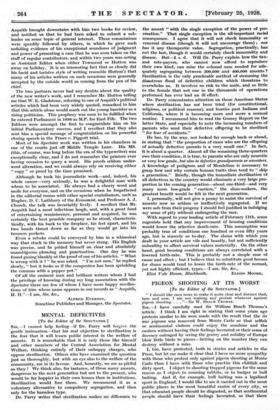MENTAL DEFECTIVES
[To the Editor of the SPECTATOR.] SIR,—I cannot help feeling—if Dr. Parry will forgive the gentle insinuation—that-his real objection to sterilization is the fear that it will lessen public interest in the welfare of aments. It is remarkable that it is only those like himself and other members of the Central Association for Mental Welfare, thinking entirely of their unhappy charges, who oppose sterilization. Others who have examined the question just as thoroughly, but with an eye also to the welfare of the community, are irt its favour. And, honestly, we are as pitiful as they ! We think also, for instance, of those many aments, dangerous to the next generation but not to the present, who would be far happier in their own homes than in institutions. Sterilization would free them. We recommend it as a voluntary alternative to compulsory segregation, and• then only for the harmless type.
Dr. Tarry writes that sterilization makes nd clifferende to
- the ament- -" with the- single exception of the power of pro- . creation." :That single exception is the all-important racial consequence. I agree that it will not check immorality or venereal disease (though it will not encourage them) ; nor has it any therapeutic value. Segregation, practically; has not the last; though -it would certainly cheek immorality and disease. But—£ s.. d. Will Dr. Parry explain- how the tax- and rate-payers, who cannot now afford to reproduce • their own kind, can raise the colossal sum needed for ade- quately segregating between 200,000 and- 400,000 aments ? - Sterilization is the only practicable method of stemming the disastrous flood of defective children which threatens. to overwhelm us. It involves no risk to the male, and so little to the female that not one in the thousands of operations performed has ever had an ill effect.
. Dr; Parry concentrates attention on -those American States • where sterilization has not been tried (for constitutional, religious, or political reasons), and hurries past Indiana and California, where it is becoming more and more a normal routine. I recommend him to read the Gosney Report on the latter State, and especially to note the increasing numbers of parents who send their defective offspring to be sterilized " for fear of accidents."
He has, by the way, not looked far enough back- or ahead, in stating that-" the proportion of cases who are the offspring of actually defective parents is a very small one." In fact, it is about a quarter. Almost all the remaining three-quarters owe their condition, it is true, to parents who are only neurotic or very low grade, but also to defective grandparents or ancestors. A knowledge of pedigrees and of Mendelism is necessary to grasp how and why certain human traits thus tend to " skip a generation." Briefly, though the immediate sterilization of all defectives in the country would eliminate a very large pro- portion in the coming generation—about one-third—and very many more low-grade " carriers," the slum-makers, the greatest benefit would be felt in the next generation.
I, personally, will not give a penny to assist the survival of aments now so seldom or ineffectively segregated. If we were safe from their progeny I should feel justified in indulging my sense of pity without endangering the race.
With regard to your leading article of February 11th, some eugenists hold that any improvement of housing- conditions would lower the selective death-rate. This assumption was probably true of conditions one hundred or even fifty- years ago, but is scarcely so to-day. The slums with which you dealt in your article are vile and beastly, but not sufficiently unhealthy to affect survival values materially. On the other hand, good housing conditions are always correlated with a
lowered birth-rate. This is probably not a simple case of cause and effect ; but I believe that to substitute good houses for slums would tend to lower the birth-rate of the normal, yet not highly efficient, types.—I am, Sir, &c.,- Eliot Vale House, Blackheath. ELDON MOORE.








































 Previous page
Previous page